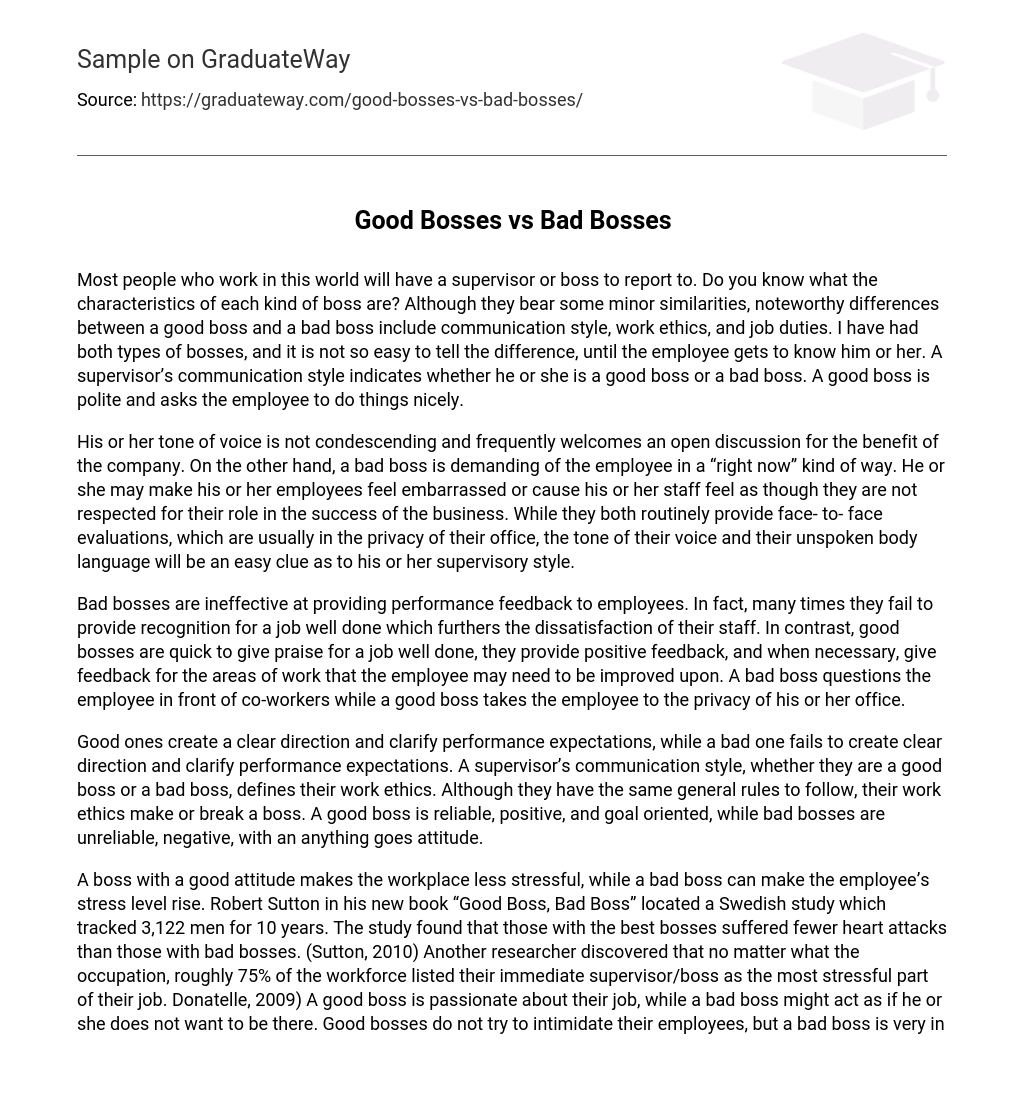When working in this world, most individuals will have a supervisor or boss to whom they report. Understanding the attributes of each type of boss holds importance. Despite some minor similarities, there exist substantial distinctions between a good boss and a bad boss. These disparities encompass communication style, work ethics, and job duties. Personally encountering both types of bosses has made it difficult to distinguish between them until one becomes more familiar with their traits. The communication style exhibited by a supervisor serves as an evident indicator of whether they fall under the category of a good or bad boss. A good boss is considerate and politely requests tasks from employees.
The tone of voice and attitude of a good boss are not condescending and they often encourage open discussions for the benefit of the company. On the contrary, a bad boss demands immediate action from the employees and may make them feel embarrassed or disrespected for their contributions to the business. Both bosses regularly conduct face-to-face evaluations in their office, but their tone of voice and nonverbal cues reveal their supervisory style.
Bad bosses are ineffective at giving employees performance feedback and often fail to recognize their accomplishments, which further lowers employee satisfaction. On the other hand, good bosses promptly praise and provide positive feedback for a job well done, while also addressing areas for improvement when necessary. Bad bosses publicly question employees in front of coworkers, but good bosses discuss matters privately in their office.
Good bosses are characterized by their ability to establish a clear direction and define performance expectations. On the other hand, bad bosses lack the capability to provide clear guidance and expectations. The communication style of a supervisor plays a crucial role in determining whether they are perceived as good or bad and this reflects their work ethics. While both good and bad bosses need to follow the same general rules, it is ultimately their work ethics that determine how effective they are. Supervisors who are reliable, positive, and goal-oriented are considered to be good supervisors. Conversely, supervisors who are unreliable, negative, and laissez-faire in their approach are considered to be bad supervisors.
A boss’s attitude can greatly impact the stress levels in the workplace. According to a Swedish study mentioned in Robert Sutton’s book “Good Boss, Bad Boss,” those who had good bosses experienced fewer heart attacks compared to those with bad bosses (Sutton, 2010). Additionally, regardless of occupation, approximately 75% of employees consider their immediate supervisor or boss to be the most stressful aspect of their job (Donatelle, 2009). Good bosses demonstrate passion for their work and create an environment where employees feel valued. On the other hand, bad bosses may exhibit disinterest and intimidation towards their employees. While good bosses treat their employees with respect, bad bosses can be rude. Finally, a good supervisor acknowledges and rewards their employees’ achievements, even if it’s as simple as an article in the paper.
Bad supervisors fail to show concern for their diligent staff within the specified time frame. The work ethics of a supervisor are evident in their responsibilities, which involve supervising a team of employees. While a good boss avoids showing favoritism, a bad boss displays preferential treatment towards certain individuals, causing others to feel inadequate. Ultimately, this conduct indicates a disregard for an employee’s self-confidence.
Both good and bad bosses are responsible for creating schedules for their staff. However, a good boss ensures that schedules are completed and shared with employees before the pay period starts, while a bad boss waits until the last minute to finish or distribute the schedules. For example, if the new schedules begin on Sundays, a bad boss releases them on the Friday before, whereas a good boss has them available on Monday or Tuesday of the previous week. Additionally, a good boss takes employee time off requests seriously and tries their best to accommodate them, whereas a bad boss may not prioritize or fulfill these requests adequately. Furthermore, a good supervisor kindly addresses and corrects an employee’s mistakes before they become habits. In contrast, a bad supervisor may overlook these mistakes or even belittle the employee for their errors. The relationship between an employee and their boss often reflects in how work is completed. Employees working under a bad supervisor typically perform worse in their jobs, while those under good supervisors demonstrate greater competence and dedication to their work responsibilities.
A good manager typically allows his employees to do their work, remaining available to help if needed. This leads to happier and more confident employees, who are productive in their work environment. In contrast, a bad manager keeps his or her door closed, avoids communication with employees, and may act rudely when interrupted.
When their supervisor frequently isolates themselves in their office, employees often require extra assistance to effectively accomplish certain tasks. This absence of guidance can directly impact employee productivity. Evaluating the competence of one’s boss is crucial for employees as their own well-being relies on it. Although there may be some similarities between competent and incompetent bosses, the distinctions are substantial. Both new and experienced employees must assess whether their manager’s work principles, communication style, and job responsibilities match their requirements.





